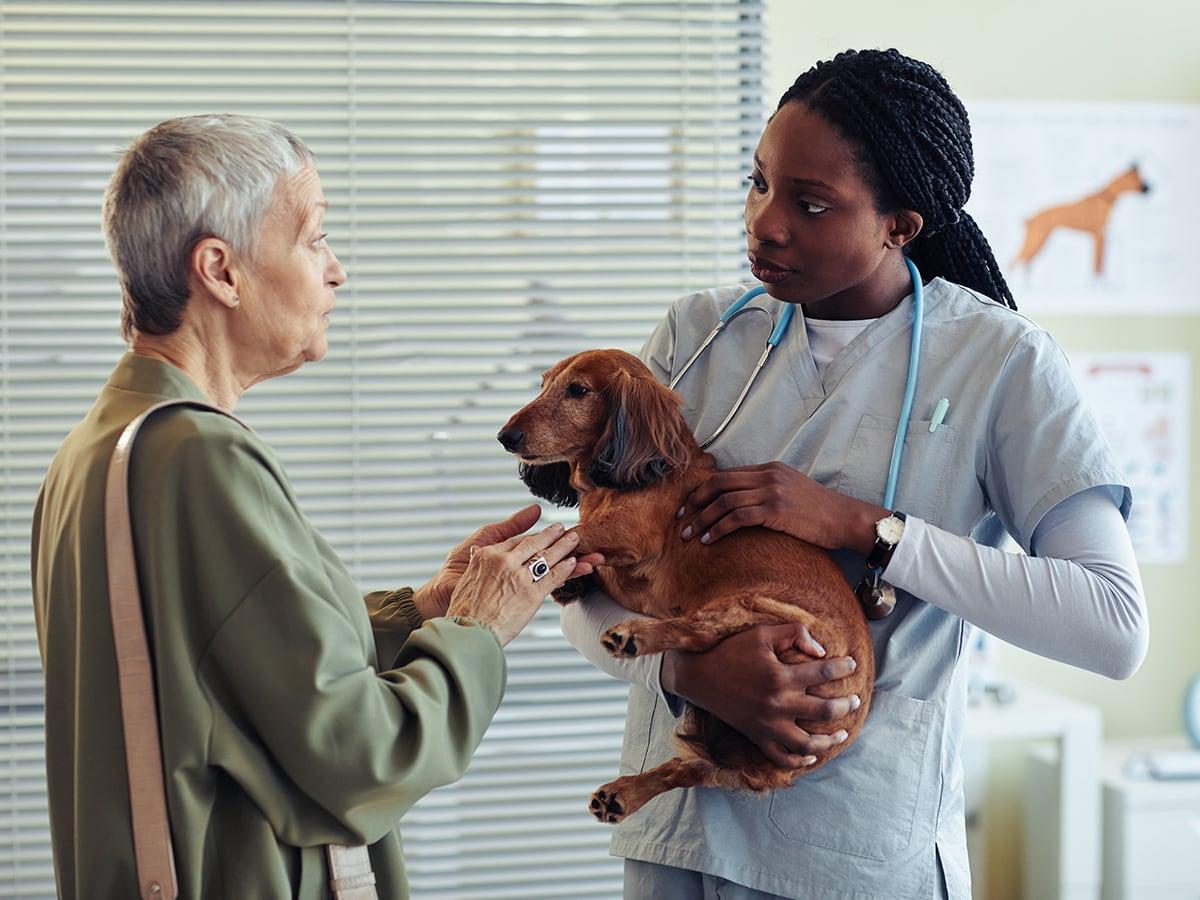We’ve mentioned various causes of diarrhea in dogs in our previous blogs, and another cause is Giardia. Giardiasis in dogs, the condition caused by Giardia, can be serious, and it’s also a public health risk since humans can also become infected. In this article, we’ll share more about giardiasis in dogs, including what causes it, how it’s diagnosed and treated, and whether it can be prevented.
Breeds commonly affected: Any breed can be affected. Young dogs and those immunocompromised or housed in crowded kennels are most at risk.
What is giardiasis in dogs?
Giardiasis in dogs refers to the disease and symptoms caused by infection with the single-celled parasite, Giardia. There are several Giardia species, but the one usually associated with illness in humans, dogs, and other domestic animals is Giardia duodenalis. This protozoal infection affects the small intestine and is spread via cysts shed in the feces.
What are the symptoms of giardiasis in dogs?
As a pet parent, it’s important to familiarize yourself with the symptoms of giardiasis in dogs, because it spreads so easily. It’s also a zoonosis, meaning it doesn’t only affect dogs, it can make people unwell too. The symptoms of giardiasis in dogs (and humans) include:
Diarrhea
Weight loss or being underweight
Blood in the stools (occasionally)
Mucus in the stools or a jelly-like consistency
However, many dogs infected with Giardia cysts show mild symptoms or no symptoms at all. This is one of the reasons why it’s so important to use good hygiene if you live with a dog, ensuring regular hand-washing, especially after cleaning up your dog’s poop.
If you notice any of the above symptoms in yourself as well as your dog, it’s a good idea to let your vet know and contact your physician for an appointment.
How does giardiasis in dogs spread?
Since Giardia cysts are shed in the feces of infected animals, the most common way that the condition spreads is via food or water contaminated with feces (and therefore, cysts). Unfortunately, domestic animals aren't the only ones responsible for spreading the infection, wild animals can spread Giardia cysts too. When animals pass feces, releasing cysts into the environment, the cysts remain viable for a long time, waiting for an opportunity to infect another host.
One reason why giardiasis in dogs can be persistent and frustrating to treat is the high risk of auto-infection (when a dog re-infects themselves). This is because the cysts can survive on an animal’s fur for a long time, so when the animal grooms and consumes the cysts, they become infected again.
How is giardiasis diagnosed in dogs?
Most cases of giardiasis are diagnosed when Giardia cysts are seen in the feces under a microscope. However, Giardia cysts can also be seen in the feces of normal dogs, who are asymptomatic carriers. A feces sample can also be tested for the Giardia antigen, and a blood test is also available, however, identifying cysts under the microscope is the preferred diagnostic method.
How is giardiasis in dogs treated?
Because of the risk of re-infection, giardiasis in dogs can be tricky to treat. However, the most effective treatment is fenbendazole, a liquid dewormer often used in puppies. This is given daily by mouth, and the course may be continued until a feces sample is clear. Another treatment option is the antibiotic, metronidazole. However, since fenbendazole is so effective, and because it’s important to use antibiotics only when essential to avoid resistance, this treatment is not as commonly used.
Can giardiasis in dogs be prevented?
Unfortunately, giardiasis cannot be prevented. However, if your dog has been affected there are steps you can take to reduce their risk of reinfection. These include bathing them regularly during treatment, cleaning and disinfecting their bowls and bed, and discouraging them from licking their rear end.
Summary
Giardiasis in dogs causes chronic or intermittent diarrhea, and can even lead to weight loss and poor body condition. It’s even more of a concern because the parasite that causes the condition can also spread to humans and other animals. Thankfully, giardiasis is treatable, and combined with good hygiene practices, you can keep your human and furry family members safe.
About the Author
This blog post was reviewed by Dr. Hannah Godfrey, a veterinarian who graduated from the Royal Veterinary College in 2011. Dr. Godfrey has a diverse background in veterinary medicine, having worked in both mixed animal practice and a busy multi-center hospital. She even pursued advanced training in canine and feline dentistry! Now, she dedicates her time to writing informative articles for pet owners. You can learn more about Dr. Godfrey and her work at petsradar.com.

Hannah graduated from the Royal Veterinary College in 2011 and began work straight away at a busy mixed practice. Initially, she treated all species, but focused on small animals from 2014. She has a passion for soft tissue surgery, ultrasound, and canine and feline dentistry, having completed additional training in these areas.
In 2018, Hannah began working at a smaller, independent practice close to home, in order to devote more time to her other loves – writing comedy fiction and spending time with her young family. She now spreads herself across clinical and non-clinical veterinary roles, including working as a locum vet, being Community Lead for a team of Human Factors trainers, and using her writing skills to help educate and inform pet owners.












